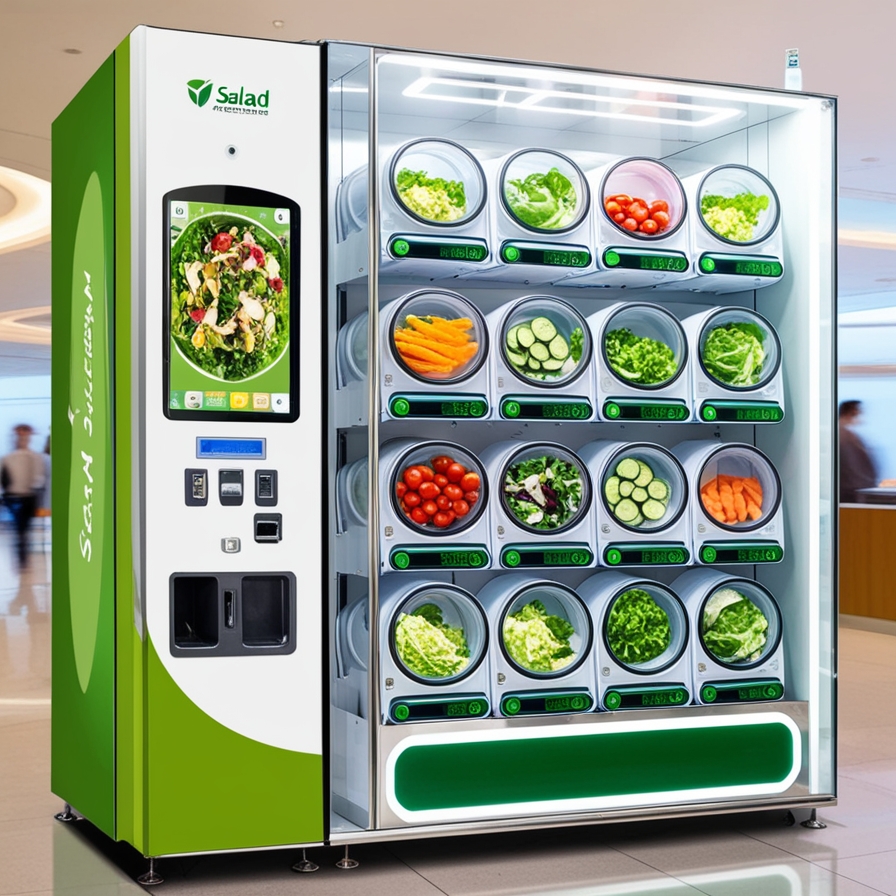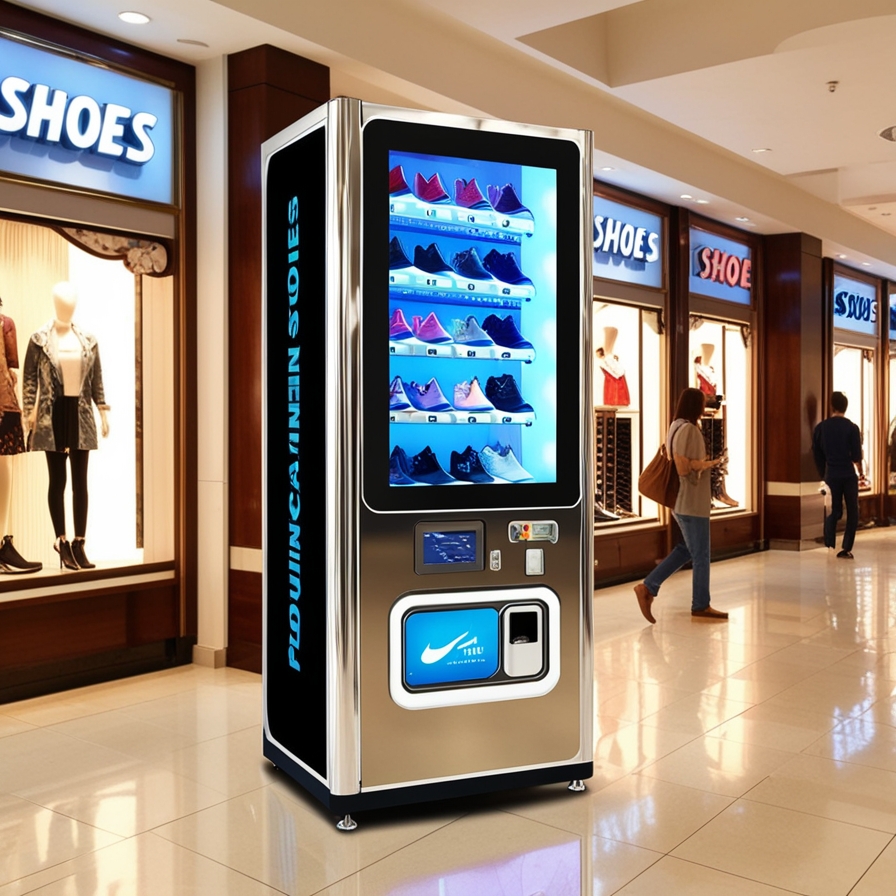Revolutionizing Reading: Book Vending Machines
Imagine walking into a school hallway and, instead of the usual snack or soda, you find a vending machine filled with books, ready to be picked up by eager young readers.
This isn’t just a delightful sight; it’s a powerful tool for literacy. Book vending machines offer a novel way to access literature, making books as easy to pick up as a bag of chips.
The Power of Accessible Literacy
Accessible literacy is crucial for community development and personal growth. It empowers individuals, enhances educational outcomes, and strengthens societal foundations.
However, not everyone has easy access to books, and this is where the true value of these machines shines. They place reading material directly into the hands of those who need it most, breaking down barriers that traditional libraries might not overcome.
Grants: Fueling Literacy Initiatives
Thankfully, grants for book vending machines are becoming a beacon of hope. They offer schools, libraries, and communities the financial support needed to implement these innovative solutions. By tapping into these resources, educational institutions can ignite a lasting passion for reading, fostering a new generation of learners equipped for the challenges ahead.
Through these grants, the goal isn’t just to distribute books but to open doors to new worlds and possibilities for every reader, no matter their background.
What Are Book Vending Machines?
Understanding the Basics
A book vending machine functions much like your typical snack vending machine but is stocked with books instead of treats.
These innovative devices are designed to dispense books to users, often through a simple push of a button or the swipe of a card.
The concept transforms the experience of choosing a book into an immediate, accessible, and engaging activity for readers of all ages.
The Mechanics of Book Distribution
These machines typically operate through a credit or token system, where students earn or are given tokens that they can use to ‘purchase’ books from the machine.
In some setups, a library card or school ID can also be used to access the books, ensuring that every transaction promotes accountability and encourages regular reading habits.
Book Vending Machines in Action
Across the country, book vending machines have been successfully implemented in diverse settings, from elementary schools to public libraries, and even community centers.
In schools, these machines serve as a reward and motivation for students, promoting literacy by allowing children to choose their books to keep.
Libraries use them to reach a broader audience, placing machines in areas where traditional library services might not be available, such as rural or underserved urban areas.
These deployments not only increase book accessibility but also encourage a lifelong love of reading by making book choice fun and exciting.
Click Here To Read
How Much is a Book Vending Machine? Here’s What They Really Cost!
The Role of Book Vending Machines in Promoting Literacy
Encouraging Young Readers
Book vending machines do more than just dispense books; they create a unique and exciting way for children to engage with reading.
By turning the selection of a new book into a rewarding experience, these machines can significantly boost a child’s interest in reading.
The novelty of using a vending machine adds an element of fun that is often absent in traditional book-picking processes, appealing especially to young learners who might otherwise be indifferent to books.
Fostering a Lifelong Love for Reading
The independence given to children as they choose their books from a vending machine fosters a sense of ownership and pride in their reading choices.
This autonomy can lead to deeper engagement with reading as a hobby, not just an academic requirement.
Schools that have integrated book vending machines report seeing increased enthusiasm for reading among their students, often with a noticeable improvement in reading skills over time.
Making a Difference in Underserved Communities
In low-income and underserved areas, access to books can be a significant barrier to literacy. Book vending machines placed in these communities can help bridge the gap by providing free or low-cost access to diverse reading materials.
For many children in these areas, a book vending machine might be their only regular source of books, making it a crucial component of their educational support system.
The impact is profound: increased literacy rates, better academic performance, and greater opportunities for personal and professional growth in the long term.
Through their capacity to attract and maintain the interest of young readers, book vending machines play a critical role in leveling the educational playing field and promoting literacy in all corners of society.
What Are Book Vending Machine Grants?
A Pathway to Accessible Reading
Book vending machine grants are financial awards given to schools, libraries, and community organizations to help them acquire and install book vending machines.
These grants are typically provided by educational foundations, literacy nonprofits, and sometimes local or state governments.
The aim is to support initiatives that promote reading and literacy, especially in communities where funding for such resources might be limited.
Why Grants Matter
For many organizations, the cost of purchasing, stocking, and maintaining a book vending machine can be prohibitive. Grants remove this financial barrier, making it feasible for institutions in diverse economic settings to benefit from this innovative literacy tool.
By providing the necessary funding, grants enable schools and libraries to implement a creative solution to the challenge of engaging readers and distributing books more widely.
Unlocking Numerous Benefits
The key benefits of book vending machine grants are far-reaching:
- Enhanced Access to Books: Grants allow for the placement of book vending machines in strategic locations, making books available to children and adults who might not have easy access to a traditional library.
- Increased Reading Engagement: With books made more accessible and fun to obtain, more individuals are likely to take up reading, fostering higher literacy rates.
- Community Empowerment: By supporting literacy and education, these grants empower entire communities, helping improve educational outcomes and providing everyone with equal opportunities for personal growth.
- Sustainability: Once established, book vending machines can continue to serve communities for years, providing enduring benefits with relatively low ongoing costs.
In essence, book vending machine grants are more than just a funding mechanism; they are a catalyst for educational equity and community development, ensuring that every individual has the opportunity to discover the joy and value of reading.
Who Can Apply for Book Vending Machine Grants?
Eligible Entities for Application
A wide range of organizations can benefit from book vending machine grants. Here’s a list of commonly eligible entities:
- Schools: Both public and private schools from kindergarten through high school can apply to support literacy programs within their institutions.
- Libraries: Public libraries as well as community and university libraries are eligible to expand or enhance their outreach services.
- Non-profit Organizations: Non-profits with a focus on education, literacy, and community development often qualify for these grants.
- Community Organizations: These include community centers, after-school programs, and other groups focused on serving community needs, especially in underserved areas.

Geographic Limitations
While many grants are available nationally, providing opportunities regardless of location, some are restricted to specific states, regions, or cities.
It’s essential for applicants to review the grant criteria carefully to determine if there are geographic limitations or if the grant is tailored to address the needs of a particular community or demographic.
Types of Grants Available
- Local Grants: These are typically offered by local businesses, municipal governments, or local branches of larger organizations. They usually focus on serving the specific needs of the local community.
- State and Regional Grants: Some grants are more extensive and cover entire states or regions. These are often funded by state education departments or regional consortia aiming to boost literacy rates across a broader area.
- National Grants: Large-scale grants provided by federal agencies or major national foundations. These grants aim to support large-scale literacy projects and can cover the installation of multiple book vending machines across various locations nationwide.
Understanding the scope of these grants and the entities eligible to apply is crucial for any organization considering a book vending machine project.
With this knowledge, schools, libraries, and community organizations can strategically seek funding that aligns with their specific needs and geographic location, maximizing their chances of enhancing literacy through innovative means.
How to Find Book Vending Machine Grants
Navigating Resources for Grant Opportunities
Finding the right grant for a book vending machine project can seem daunting, but there are several resources designed to make this process smoother:
- Grant Databases: Websites like Grants.gov, Foundation Directory Online, and GrantWatch are invaluable for searching a wide range of funding opportunities. These platforms allow users to filter searches by focus area, such as education or literacy, and by eligible entity type, making it easier to find relevant grants.
- Local Government Websites: Many local and state governments list available grant opportunities on their websites, especially those aimed at educational and community development projects.
- Educational Foundations: Foundations such as the Dollar General Literacy Foundation and the Barbara Bush Foundation for Family Literacy frequently offer grants that can be used for purchasing and maintaining book vending machines.
Organizations Offering Grants
Several organizations and initiatives are known for their support of literacy projects through grants:
- The Children’s Literacy Foundation (CLiF): Often offers grants specifically for rural schools and libraries, which can include funding for book vending machines.
- The Laura Bush Foundation for America’s Libraries: Provides grants to update, extend, and diversify the book collections of school libraries, which can sometimes cover innovative distribution methods like book vending machines.
Current and Upcoming Grant Opportunities
- Innovative Approaches to Literacy (IAL) Program: Sponsored by the Department of Education, this program frequently offers grants that can be applied towards literacy-promoting projects, including book vending machines.
- Local Literacy Partnerships: Checking with local educational and literacy councils can also reveal more localized grant opportunities that may not be widely advertised.
Staying updated on grant cycles is crucial, as many grants have specific timelines for application.
Signing up for newsletters from grant-funding organizations, joining relevant forums, and maintaining active memberships in educational associations can also provide timely information on when and how to apply for these grants.
Steps to Apply for a Book Vending Machine Grant
1. Research Potential Grants
Identifying the right grant for your organization involves several strategic steps:
- Assess Your Needs: Clearly define what you need the grant for, whether it’s purchasing the machine, stocking it with books, or both. Knowing your exact needs will help filter potential grants.
- Search Widely: Utilize grant databases, educational foundations’ websites, and government portals to find available grants. Tailor your search to include keywords related to literacy, education technology, and community outreach.
- Evaluate Fit: Consider the grant’s objectives and see how they align with your organization’s goals. Also, review past recipients to gauge the grantor’s preference for certain types of projects or organizations.
2. Prepare Your Application
Crafting a compelling application is crucial to securing funding:
- Mission Statement: Clearly articulate your organization’s mission and how the book vending machine will help further that mission.
- Project Description: Detail the implementation plan, including how the machine will be used, its potential impact, and how it fits into broader educational or community goals.
- Budget: Provide a detailed budget that outlines all costs associated with the project. Be transparent about other funding sources if applicable.
- Supporting Materials: Include data or research that supports the need for a book vending machine in your area, testimonials, or case studies of similar successful projects.
3. Submit the Application
When submitting your application, follow these tips to ensure a smooth process:
- Check Completeness: Review the application guidelines thoroughly and ensure every required section is complete and attachments are included.
- Adhere to Guidelines: Format your application according to the grantor’s specifications. Pay close attention to word counts, required documents, and submission methods.
- Proofread: Errors can detract from the professionalism of your application. Proofread for grammar, spelling, and clarity.
4. Follow Up
After submitting the application, take these next steps:
- Confirmation of Receipt: Make sure the funding body confirms they have received your application. If confirmation isn’t automatic, don’t hesitate to reach out.
- Stay Engaged: If possible, keep in touch with the grantor to express your continued interest and readiness to provide additional information if needed.
- Prepare for Next Steps: Be ready to participate in interviews or presentations if the grant process requires it. Also, plan for how you will implement the project if the grant is awarded, or how you will proceed if not.
Applying for a book vending machine grant is a thorough process that involves careful planning and attention to detail. By following these steps, you can increase your chances of success and bring the joy and educational benefit of a book vending machine to your community.
Success Stories: Communities Impacted by Book Vending Machines
Empowering Readers in Rural Schools
In a small rural town in Vermont, a local elementary school received a grant to install a book vending machine in their main lobby.
The school, which had struggled with a declining library budget, saw an immediate increase in reading among students excited by the novel way of selecting books.
The principal noted, “It’s like watching kids at a candy store, only they’re walking away with books!” Within the first year, the school reported a 20% increase in reading scores among students who regularly used the vending machine.
Transforming Literacy in Urban Neighborhoods
A community center in an underserved urban area of Detroit implemented a book vending machine with the help of a national literacy grant.
The center, which serves a large population of children without easy access to public libraries, used the vending machine to provide free books to children.
The center’s director shared, “The book vending machine has not only provided access to books but has become a cornerstone for our literacy programs.”
They’ve seen a significant uptick in kids engaging in their reading programs and parents getting involved in community literacy efforts.
Revitalizing Library Access
A public library in a suburban neighborhood of Oregon utilized a grant to place book vending machines in local grocery stores and community centers, reaching those who might not visit the library regularly.
This initiative dramatically increased library engagement from broader community members, with one local resident stating, “I hadn’t been to the library in years, but getting a book while I shopped made me remember how much I loved to read.” The library saw a 30% increase in new memberships and a resurgence in library visitation rates.
These stories illustrate the profound impact that book vending machines can have when paired with the support of grants. By breaking down barriers to access, these machines help foster a love of reading across diverse communities, demonstrating that when books are made available, people of all ages and backgrounds are eager to engage with literacy.
Tips for Successfully Securing a Grant
Crafting a Compelling Grant Application
- Tailor Your Narrative: Customize your application to align closely with the grant’s objectives. Clearly demonstrate how your project fits within the funder’s mission and how it addresses a specific need or problem.
- Use Persuasive and Clear Language: Write clearly and persuasively, using specific examples of what you plan to achieve and the impact it will have. Avoid jargon and technical terms that could obscure your message.
- Include Data and Research: Support your application with relevant data, research findings, or statistics that underscore the need for a book vending machine in your community and predict the potential impact.
Common Mistakes to Avoid
- Overlooking Guidelines: Failing to follow application guidelines meticulously is a common mistake. Every requirement, from format to word count, matters significantly.
- Being Vague: Vague descriptions of your project’s goals, implementation plan, or budget can weaken your application. Be precise about what you need, why you need it, and how you will use the funds.
- Ignoring the Budget: A well-planned budget is crucial. Make sure your numbers add up and that you account for all possible expenses related to the project.
Standing Out Among Applicants
- Show Impact Beyond Literacy: While the primary goal is to enhance literacy, showing additional benefits, such as community building or supporting local education initiatives, can make your application stand out.
- Demonstrate Sustainability: Funders prefer projects that have a lasting impact. Demonstrate how your project will continue to benefit your community beyond the initial implementation.
- Leverage Community Support: Show evidence of community support, whether through local partnerships, volunteer commitments, or matching funds. This demonstrates readiness and broad-based backing for your project.
Including Testimonials or Endorsements: Having endorsements from community leaders, educators, or even previous grant recipients can significantly strengthen your application. These testimonials can provide credibility and a real-world connection to the benefits of your proposal.
By following these tips, avoiding common pitfalls, and carefully preparing your application, you can enhance your chances of securing a grant for a book vending machine and make a meaningful difference in your community’s literacy and educational opportunities.
Grant Application Platforms and Organizations Offering Grants
- Grants.gov – Grants.gov is the largest portal for federal grant opportunities, providing a comprehensive database where you can search for education and literacy grants.
- Foundation Directory Online – Foundation Directory Online offers detailed information on private foundations, public charities, and corporate giving programs that offer grants including those for literacy projects.
- The Dollar General Literacy Foundation – This foundation provides funding for literacy programs that include book vending machines. More details can be found on their website Dollar General Literacy Foundation.
- The Laura Bush Foundation for America’s Libraries – For grants specifically aimed at school libraries, visit The Laura Bush Foundation.
Reading Materials and Videos on How to Apply for Grants
- “Grant Writing For Dummies” by Beverly A. Browning – A comprehensive guide that covers all aspects of the grant writing process, available at most bookstores and libraries.
- Foundation Center’s Proposal Writing Short Course – Available for free at Proposal Writing Short Course, this course offers step-by-step instructions on how to craft a grant proposal.
- YouTube Channels – Channels like “GrantMan” offer tutorials and tips on grant writing and application processes.
Templates for Grant Applications
- TemplateLab – TemplateLab offers a variety of free templates for grant proposals that can be downloaded and customized.
- Canva – Canva provides templates for creating visually appealing grant proposals which can help make your application stand out. Visit Canva Grant Templates.
- Microsoft Office Templates – For a more formal and standard approach, Microsoft Office has several grant proposal templates available on its platform Office Templates.
Utilizing these resources can enhance your ability to successfully secure a grant by providing detailed guidance, accessible tools, and professional templates, ensuring your application is well-prepared and compelling.
Personal Experience To get Book Vending Machine Grant
In 2024, I am poised to secure a book vending machine grant by carefully researching suitable opportunities and meticulously preparing my application. I will explore various grant databases and resources from literacy-focused organizations to ensure a well-informed approach.
My application will detail the community’s need for a book vending machine and the transformative impact it could have, backed by a thorough budget and strategic plan.
Demonstrating community support and project sustainability will be crucial to distinguish my proposal. By leveraging available tools and adhering to a structured application process, I aim to successfully acquire a grant that will support my goal of enhancing literacy and education in my community.



